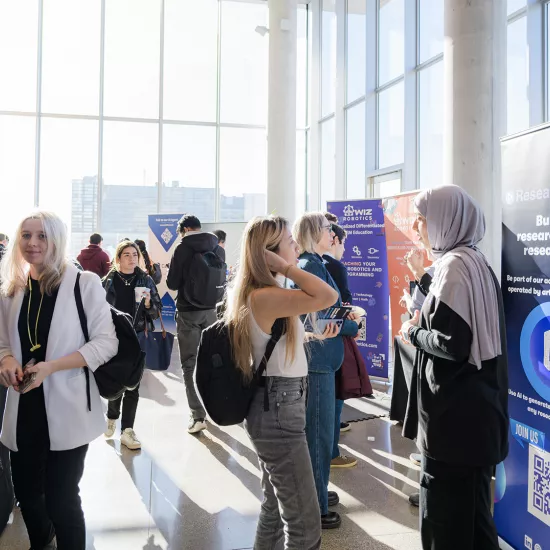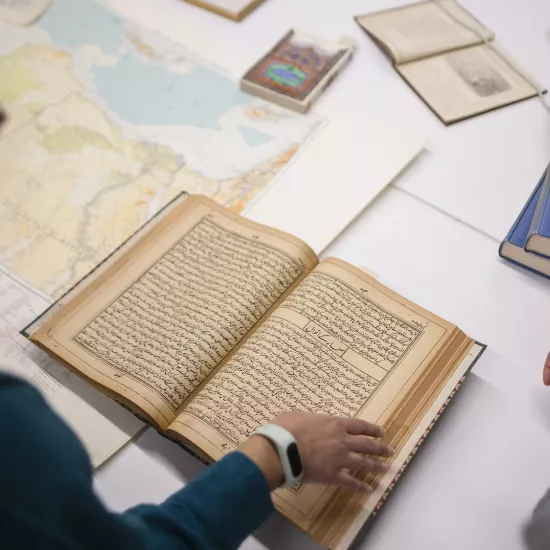Come Together: UTM teach-ins grapple with realities, solutions to climate change

This week, U of T Mississauga faculty led teach-ins as part of the campus response to the worldwide Global Climate Strike happening on Sept. 27. That’s the day when millions around the globe will take to the streets to combat climate change.
The teach-ins use old concept to grapple with a modern problem. The format harkens to the 1960s when American college students and faculty gathered for free form debates about the Vietnam War. The sessions helped participants to find common ground, and built important momentum for widespread public protests against the contentious war. In recent years, the concept has seen a resurgence amongst environmental educators and civil rights activists.
“What better way to consider the issue of global environmental change, which is affecting everyone at the same time in different and unpredictable ways,” says Professor Amrita Daniere, vice-principal, academic and dean, whose office has organized the Global Climate Strike response on the UTM campus. “The idea is that if we work together and share our knowledge, we might be able to figure out what to expect and how we might support each other in the future to make changes in the way we live our lives and create more sustainable societies.”
Like the teach-ins of the 1960s, the r UTM events will take an organic form with opportunities for everyone to speak or ask questions. Associate Professor Stephen Bede Scharper of the Department of Anthropology, will co-lead one of the one-hour sessions in the CCT courtyard. “A teach-in is open-ended and speaks to a democratic tradition of freedom of expression, and airing concerns with people who have some background in this area and others who also have a vested interest in the state of the planet.”
Talking points have been collected from notes posted by students to a “Thoughts Tree” hosted by the UTM Library during O-Week, and from submissions to UTM’s Instagram channel. The submissions follow common themes of fear and hope about the future and suggestions for actions big and small: “melting arctic,” “hope that humans might be able to turn it all around in time,” “those in power do not have the will to act,” “If I have kids, they will suffer from the problems we’ve created.” In “reasons to be optimistic”, one note simply reads “Greta,” referring to teen climate activist Greta Thurnberg.
“These notes give us an idea of where the students are coming from,” says Associate Professor Andrea Olive of the Departments of Political Science and Geography, who is co-leading a teach-in. “We will be there for students who want to speak and voice their questions and concerns and we will field those and try to answer them as honestly as we can.”
“As a political scientist, I can speak to the importance of the upcoming election, and political action,” Olive says. “I want people to know that the [federal] election on Oct. 21 matters, and that democracy matters in a really big way.” Olive also hopes that participants will understand that consumerism is important in solving climate change. “Every time you purchase things, you vote for it,” she says. “It’s so easy to buy and consume things, like drinks in non-recyclable cups. These things add up—our daily actions matter.”

“I'm hoping that through this teach-in people can begin to imagine new things,” adds Scharper. “If we do scale back and move in a different direction, the polar ice caps can reform and the rain forests can begin to regenerate. We can help to accelerate the process of land and aquatic restoration, so this is a hopeful message.”
“We want people to walk away feeling inspired to act with more knowledge about the ways they can make a difference,” adds Olive. “I want people feel encouraged to get involved and hold politicians accountable for the things they said they were going to do.”
Undergraduate student Dana Huve attended the morning teach-in seeking information about actions she could take to combat climate change. “I look for ways to make change through what I do every day,” says the first-year life sciences student, adding that she eats a plant-based diet and is getting involved on campus with the Zero Waste Club and the O-Week river cleanup event. Huve says the teach-in taught her how to spread the word about climate change to others. “I learned that there's different ways of reaching people and changing things, like politics, writing newsletters and journal articles, or even just finding common ground with each other. You have to talk to one another and share information. It’s a huge task for one person, but collectively we can make a difference.”
“The Global Climate Strike is a moment in history that foregrounds climate change, but has as its focus long-term changes in practice and attitudes that are all about more sustainability,” says Daniere. “As a university in a country that really has a lot to contribute in terms of knowledge, as well as very high consumption of resources per person, UTM can use this event to engage our community and, hopefully, inspire change.”
See the full calendar of UTM Global Climate Strike events here >



